Who remembers #ImprovRespect?
A casual reflection on one of Lindy Hop's big conversations.

First Alternate: A Lindy Hopper's Newsletter

This is intended to be a very casual, ten-year retrospective on this weird moment in our recent history. I’ve anonymized some names, but kept the important ones.
When Helen and I found out we made finals in the Amateur Lindy competition at Camp Hollywood this past weekend, we went to go refresh ourselves on our fast dancing, came up with one or two options for exits, and…not much else. When we felt like we were coming up with too much stuff, we’d jokingly toss back at each other a phrase that had burned itself into our Lindy Hop baby brains: #ImprovRespect.
I started dancing in 2012 and Helen a year later. We wouldn’t meet until 2017, but we were both obsessives from our earliest days, and as it turned out, we both remembered the Facebook conversation surrounding ILHC 2014 extremely well.
It was the first time I remember seeing so many professional or well-known dancers having a public conversation, enough that a lot of them ended up on the newsfeed of me, a twenty-year old member of a college swing dance club with two exchanges, two local workshop weekends, and an obsessive watch of everything available from ILHCs 2011-2014 under my belt. These people who I watched on TV at the group house where all the swing dancers lived were real people? With opinions??? Well, I simply must know what they are!
Here are the posts that started it all:
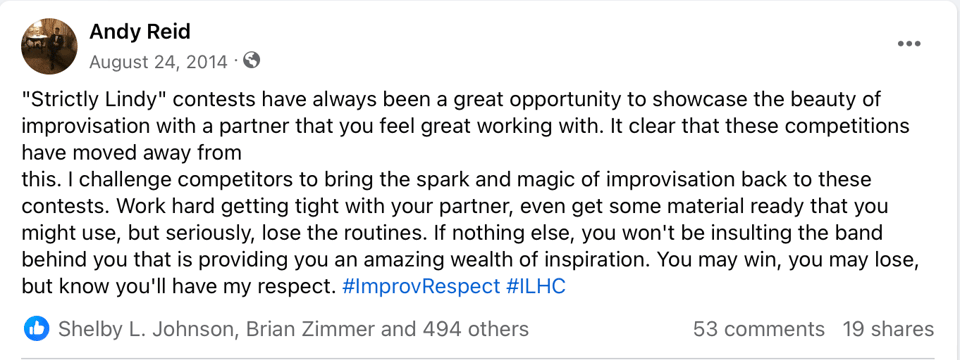

Scores of people in the comment sections of these posts, and in their own posts, agreed that the problem of couples choreographing every single count of their eight 8s, and sometimes even their all-skates!! had become pretty egregious.
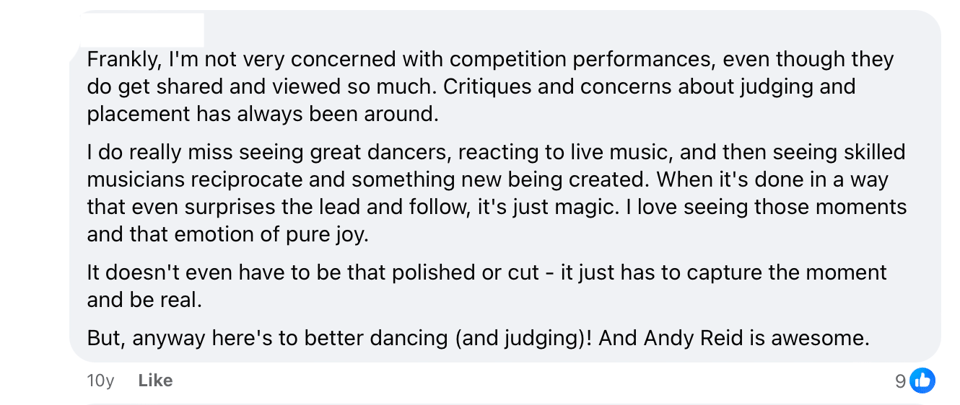
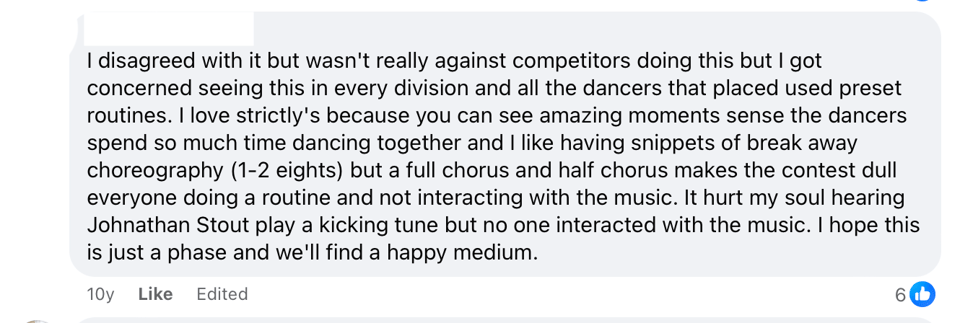
Others gave credence to just how difficult it is to not prioritize making sure your cool shit gets out there, especially when as a competitor, you know your time is so limited:
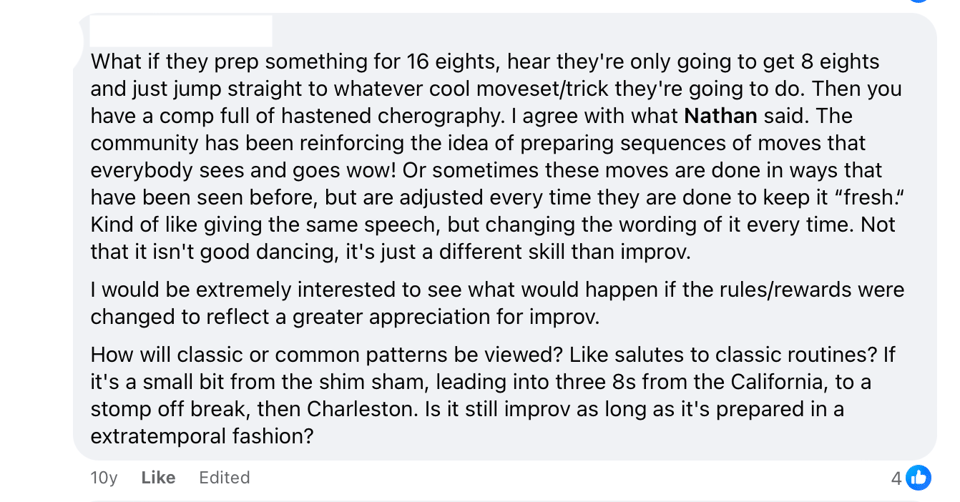

Most, including Andy, kept stressing what was actually a pretty moderate take: get better at this. Choreographing some stuff that you can throw in when it feels right is one thing, but choreographing everything is, many argued, lowering the difficulty level and risk of what you put out there, no matter how cool the tricks are.
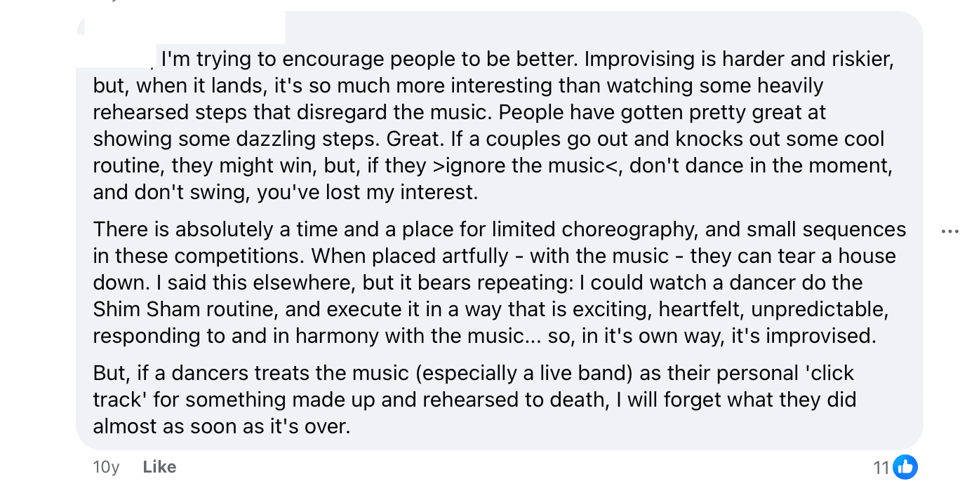
I agree with this to some extent. Choreography is a skill, one that is baked into almost any style of dance that has ever been performed for an audience, but the art of making that choreography look effortless, musical, unrehearsed? That’s tough! Sometimes the band will help you, sometimes they’ll hang you out to dry (we’ve all seen it). It’s a risk!
Many turned to the judges and organizers, saying it’s on them to reward improvisation over choreography. While that’s an interesting part of the conversation, I am wary of this email getting too long, so I will just include an (attributed) comment that could not sum up the inevitable conclusion of that side of things better:

I will not drag Andy Reid or any other of the big players in this conversation unwillingly into my reminiscing by linking directly to their Facebook posts. I also feel no need to mention the people whose dancing kicked off this whole affair, because they’re very different people and dancers now. I did drag my friends Carl Nelson, Nicole Zuckerman, and Shelby Johnson into it, though, who made the mistake of posting about this ten years ago and then becoming my friends years later. In talking to Carl, Nicole, and Shelby, this was the main thing they expressed: they still would rather see more improv in strictlies, but #ImprovRespect lost.
Watching this conversation unfold, and then living through the years that followed, taught me that this is how most of these conversations tend to go: a bunch of people of varying abilities to get their points across express their opinions, talk around each other, and everything remains status quo. (I think there is one clear exception to this: it is difficult to reconcile the dancer who was the original subject of this controversy in 2014 with the dancer they are in 2024.) People do sometimes improv their strictlies, people sometimes even reach the (in my opinion) ideal combination of choreography and improv that makes your jaw drop, or even choreography that’s so adaptable you could mistake it for improv, but it is definitely not the norm.
Witnessing this conversation did train me, early on in my dance “““career,””” to watch for the things Andy pointed out, and it resulted in an early disinterest in this category—because I couldn't unsee it. Everyone was doing it. The magic was gone. Only in the past few years have I returned to watching high-level strictlies, and usually just to see what that category is reliably good for: crazy new air.
As a competitor, honestly, I get it. Strictlies are often done at such a breakneck pace and in such short spurts that to not choreograph exactly what you want to show off is a risk it makes sense that people don't want to take. Except...is that true?
Lindy hop contests have changed a bit over the years, as more competitors enter the field, trends come and go, and organizers experiment with the minutiae of how things are done. All-star and Invitational strictlies still exist in the 230+ BPM range, but what about the other ones?
This year the Amateur Lindy contest at Camp Hollywood ran at roughly 210 BPM. Last year's version of that same contest ran at a glacial 198 BPM. ILHC's Open level strictly's fast round was 218 BPM, but last year's was 200 BPM. The level of choreography present was about the same in all of them! This is where most competitors exist, and competitors learn from their heroes and their peers, and most of them are choreographing their spotlights.
Believe it or not, I don't have a particularly strong opinion one way or another about this. It’s difficult (but not impossible!) to even talk about this from a historical lens of Lindy Hop, because strictlies are such a modern invention. And I've talked to enough judges and witnessed enough contests that I've long since stopped trying to reconcile what judges say they look for and what they reward. The chaos has become part of the fun of it for me! And let me just say: I was just in a strictly and the people who beat me seemed like they choreographed, and they one hundred percent deserved to beat me! Their choreography was better than my improv and it wasn’t close.
But I do find it interesting that what was such a point of contention ten years ago is so baked in now that I can't imagine it being moralized in the same way in a public forum. And despite everyone doing it, and everybody knowing that everybody does it, it's a bit gauche to talk about it. Why is that?
When talking to friends about this, and in reviewing the original conversation, what came up a lot was the lack of adaptability available to you when you lock yourself into your choreo. If you choreograph for a 230+ BPM contest and the music starts, and it's 200 BPM, why not toss your choreo out the window? Why not be willing to move bits and pieces of your ideas around to fit the music, or chuck them altogether? Why not train your brain and body for social dancing at a high tempo, in case you want the option?
I have my ideas (I think it's mostly inertia), but I don't really have an answer to this. If you've got thoughts, shoot me an email, send me a DM! I'd love to hear them.
You just read issue #2 of First Alternate. You can also browse the full archives of this newsletter.